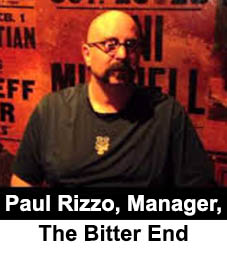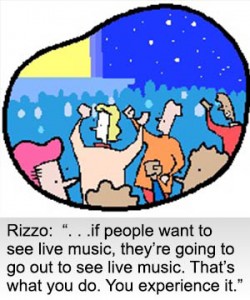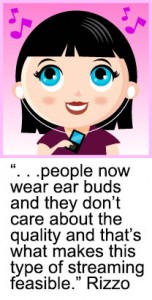Last week’s blog focused on the highly successful Bitter End, a rock-oriented club in New York City’s Greenwich Village and its business manager Paul Rizzo––a former bartender, who did lighting design on the side when he was a business major student at Stonybrook, a four-year college, part of the State University of New York.
The Bitter End was founded in 1961 and has been host to a multitude of young performers who today are legendary: Lady Gaga, Bill Cosby, Bob Dylan, etc. The Bitter End has a multi-year history with streaming.
This week’s blog continues the conversation with Rizzo, but focuses heavily on “who benefits from video streaming?” His perspective is tempered by long experience in the music industry. His comments are raw but on target.
 RIZZO: Down the road eventually the benefit will always be the music industry if they find a way to capitalize on it.
RIZZO: Down the road eventually the benefit will always be the music industry if they find a way to capitalize on it.
MARLOW: Are the musicians going to benefit?
RIZZO: Do the musicians ever gain from the record industry? They gain very little. ASCAP, BMI gather their things and the same industry people are still the biggies in the industry. You have your writer’s rights at 50%. It all depends on what they trickle down. They do creative accounting and only certain amount gets to the musicians. The musicians always get screwed—always in all walks—especially band members who don’t get the writing credit.
MARLOW: Are the major record companies going to benefit?
RIZZO: Are there any major record companies left? I don’t think they’ll ever benefit, unless they accept it.
MARLOW: Who will? Will the clubs?
RIZZO: I’m about to do something very shortly. It’s going to be a broadcast stream, an audio stream that’s going to sell. It’s a monetized audio stream. You have to have approval by the artists. The band’s going to get a piece, the club will get a piece, the creators will get a piece, and Apple will get a piece. It’s split four ways. It’s like $2 a broadcast and you can listen to it on your iTouch and your iPad. It’s an App.
Do I think they’ll gain? I don’t know. At 20 or 30 cents a moment, no, I don’t think you’re making a lot of money. I put a couple of hundred dollars into it. To put it all together, so we could have broadcast quality with microphones, getting room sounds, and making it good broadcast quality. But do I think I’ll make millions of dollars from it? No. I don’t think I’ll ever make millions of dollars from anything ever. People have to be willing to pay it. And I don’t think people will be willing to pay because if it goes big, you’ll get like a penny per prescriber like Time Warner does. What does MSG get? A penny a prescriber and broadcast rights. It will -always get watered down to the end . . . eventually someone will make some money. The start-ups will make some money. It all depends on what they give back. I don’t ever think there’s ever going to be a lot of money in it. But pennies here and pennies there add up to a lot of money. So if you do pennies here and pennies there, it adds up.
MARLOW: Is there anything else to this issue?
 RIZZO: I don’t think of streaming as a money maker. Maybe that’s a shortfall of my own. I understand the model of Amazon or e-Bay. Pennies over a million pennies adds up. But I don’t think it’s as popular as people think. Everyone says, “Oh you stream live. Isn’t that going to hurt your live viewer? They’re not going to come.” No, if people want to see live music, they’re going to go out to see live music. That’s what you do. You experience it.
RIZZO: I don’t think of streaming as a money maker. Maybe that’s a shortfall of my own. I understand the model of Amazon or e-Bay. Pennies over a million pennies adds up. But I don’t think it’s as popular as people think. Everyone says, “Oh you stream live. Isn’t that going to hurt your live viewer? They’re not going to come.” No, if people want to see live music, they’re going to go out to see live music. That’s what you do. You experience it.
I never get the same experience of watching a video at home. Like when they broadcast a concert. When I watch one of those things on PBS to raise money or I watch a live show, they used to have showings in movie theaters via closed circuit back when they started this—like The Who did a final tour or boxing would do closed circuit viewing where you pay $60 for pay per view—I don’t get that. I don’t get the same joy out of it and I’m a music lover. I just don’t get the same joy out of watching it on television.
The Allman Brothers video stream and audio stream their shows from the Beacon Theater. I don’t get it, because to me it’s not the same. I don’t get the same joy out of it as seeing the show live. So I don’t think it will be too big of a catch on.
But I can’t speak for the 22 and 23 year olds who gave up good sound for MP3s. They don’t care. That’s what made live recordings come back. I’m a Deadhead. I used to listen to crappy live recordings on cassette. And I sort of enjoyed it because you get different versions of different songs. I wouldn’t get the same vibe I would get from a regular concert but they were trading in tapes from the ‘70s. People would record every show. They had a taper section and they were quality tapes and you would hear stuff you never heard before and you get to hear different versions of different songs or you get a copy of a show you went to.
 But the quality was never great. And a lot of artists didn’t want to release stuff that wasn’t quality live. Peter Frampton Live was a great quality live-album and that triggered off a lot of live recordings. Zappa used to record everything he did in high-quality so he’d have all that type of stuff. A lot of jazz stuff was probably recorded live because that’s how it was put out. A lot of the jazz recordings you would get were “Live at Monterey” and that what you heard for the first time as a recording. As far as the quality—that went down. But people now wear ear buds and they don’t care about the quality and that’s what makes this type of streaming feasible.
But the quality was never great. And a lot of artists didn’t want to release stuff that wasn’t quality live. Peter Frampton Live was a great quality live-album and that triggered off a lot of live recordings. Zappa used to record everything he did in high-quality so he’d have all that type of stuff. A lot of jazz stuff was probably recorded live because that’s how it was put out. A lot of the jazz recordings you would get were “Live at Monterey” and that what you heard for the first time as a recording. As far as the quality—that went down. But people now wear ear buds and they don’t care about the quality and that’s what makes this type of streaming feasible.
When we were growing up, we wouldn’t put up with this crappy sound. We wouldn’t stand for it. We wouldn’t buy something that sounded like this unless it was something we couldn’t get or find. But as a regular medium, as a stream people wouldn’t go for that. I know so many musicians who won’t listen to themselves on an iPod because they don’t like the way it sounds.
That’s another thing, when I have to start getting approval for this streaming, that will cut down on it a lot. If the bands have to approve it going out, a lot of them get skeptical; a lot of them don’t want it to be steamed; a lot of them don’t want it to be sold; a lot of them are worried about getting ripped off. A lot of people in the industry already have gotten ripped off. So when I used to have to get approval for Collegemusic.com a lot of people didn’t want to do it.
When I stream now everyone’s so pumped that I’m doing it, they call all their friends right before the show and say “Oh, by the way we’re streaming.” Or like a band from Boston—they’ll call their parents and they say “you can watch it on so and so” and they get excited about it. But a lot of the bigger bands don’t get excited about it because they care about the quality of the music but now I don’t think the younger bands care about it all that much.
Please write to me at meiienterprises@aol.com if you have any comments on this or any other of my blogs.
Eugene Marlow, Ph.D.
June 17, 2013
© Eugene Marlow 2013


